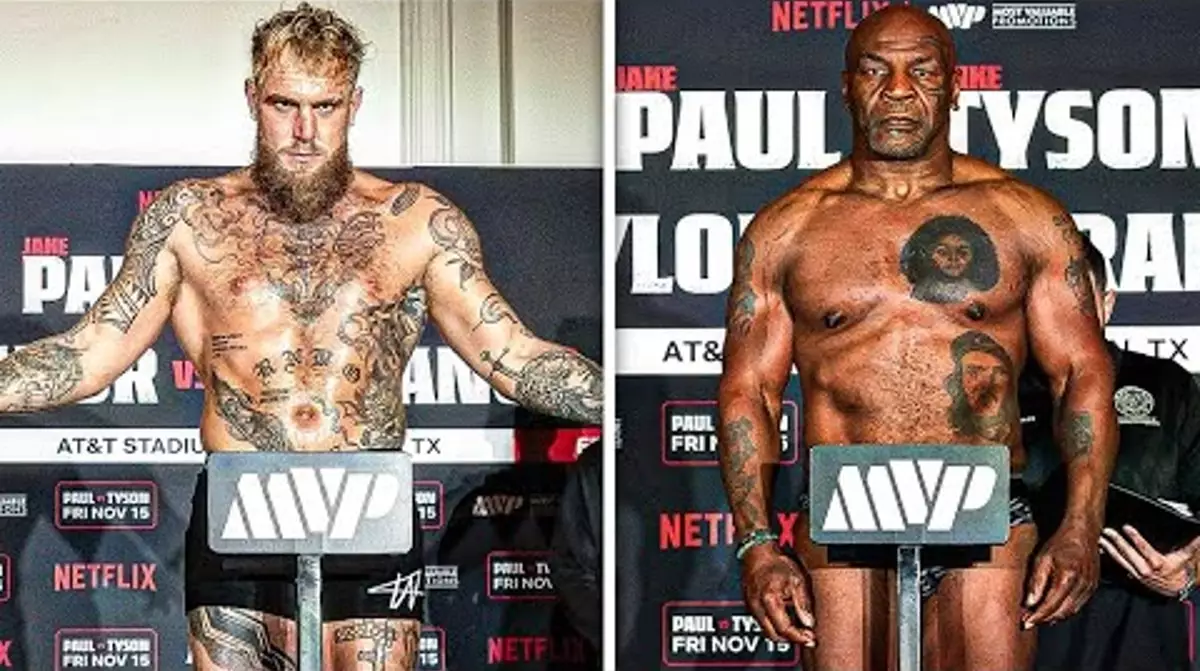The world of boxing has always been a battleground where skill, courage, and strategy converge. However, recent events show a shift in the sport’s landscape—one that raises eyebrows and skepticism among purists. The upcoming fight between Mike Tyson, a name synonymous with boxing’s glory days, and Jake Paul, a YouTube star turned amateur pugilist, encapsulates this growing trend of celebrity boxing. With each bout, the once-honorable rings of professional boxing seem to be morphing into a spectacle more akin to reality television.
Mike Tyson’s legacy is a complex tapestry woven from his extraordinary talent, controversial behavior, and a trail of memorable bouts. He holds the distinction of being the youngest heavyweight champion in history, a feat that remains impressive to this day. Yet, as time has passed, Tyson’s notoriety has overshadowed his accomplishments. Once a fierce competitor capable of knocking out opponents with unimaginable speed and power, Tyson’s career trajectory has veered into an arena where his past glory is banked on rather than validated by recent performance.
Despite his numerous accolades, critics argue that Tyson’s reign included a pattern of cherry-picking opponents that allowed him to maintain an undefeated record against less formidable challengers. Fights against notable figures like Larry Holmes and Spinks come to mind, where Tyson capitalized on the advanced age or diminished skills of his opponents. This raises serious questions about authenticity in Tyson’s achievements, boiling down to the notion that his legacy might not be built on unassailable prowess but on calculated matchmaking.
In stark contrast, Jake Paul’s ascent to boxing fame has been as unconventional as it gets. Originally gaining fame through social media and YouTube, Paul has stepped into the boxing ring with a bravado that belies his inexperience. With a professional record that claims 11 victories against primarily retired mixed martial artists and influencers, many would argue that he lacks the pedigree typically associated with legitimate fighters. His bout against Tyson, a seasoned veteran whose exploits in the ring have been fiercely scrutinized for decades, is an intriguing yet troubling matchup that exemplifies the blurred lines between authenticity and performance art in boxing.
Paul’s ability to attract headlines and generate conversations serves as a testament to the power of modern celebrity. In an age where social media clout can be more valuable than a lifetime of training, Paul has harnessed his fame and promotional capabilities masterfully. However, questions loom large regarding his actual skill set. While he may market himself as a fighter, the reality is that he has yet to prove himself against those who have dedicated their lives to the sport. Yet, the very fabric of contemporary boxing seems to reward spectacle over substance, a trend epitomized by the looming clash of Tyson and Paul.
As the fight draws near, the advertising flurry has amplified. Both Tyson and Paul are positioned as larger-than-life characters in an absurd showdown. With Tyson, known for his fierce demeanor and a history fraught with controversies—including infamous moments such as biting an opponent’s ear—against a YouTuber who built a career on viral antics, the fight appears less about boxing and more about entertainment value.
Critics are quick to point out the surreal nature of this matchup—the fact that a man who once dominated the heavyweight division is now stepping into the ring with someone who has turned a career out of pranks and stunts. Many worry that this pairing reduces the sport of boxing to little more than a reality show, where the narrative takes precedence over the discipline and spirit that boxing once upheld.
This upcoming fight is a microcosm of the current state of boxing—one where celebrity status and online fame eclipse traditional markers of excellence like training, grit, and skill. For purists, the degradation of boxing into this form of entertainment is disheartening. Tyson’s match against Paul underscores a broader trend of commodifying athletic competition, where marketability seems more crucial than meritocracy.
With millions of eyes glued to screens and vast financial gains on both sides, it begs the question: what does this mean for the future of boxing? As public interest continues to center on the spectacle of fights rather than the sport rigorously, the integrity of boxing may face unprecedented challenges. Will we see another young heavyweight rise through the ranks, or is boxing destined to be defined by marketing and gimmicks over genuine talent?
The approaching fight between Mike Tyson and Jake Paul reinforces the precarious balance in sports between authenticity and entertainment. It serves as a stark reminder that in the pursuit of viewership, the essence of combat sports is at risk of losing its former glory. This spectacle, steeped in marketing genius, might just become the defining moment of our time—a fitting metaphor for the age of instant celebrity.

